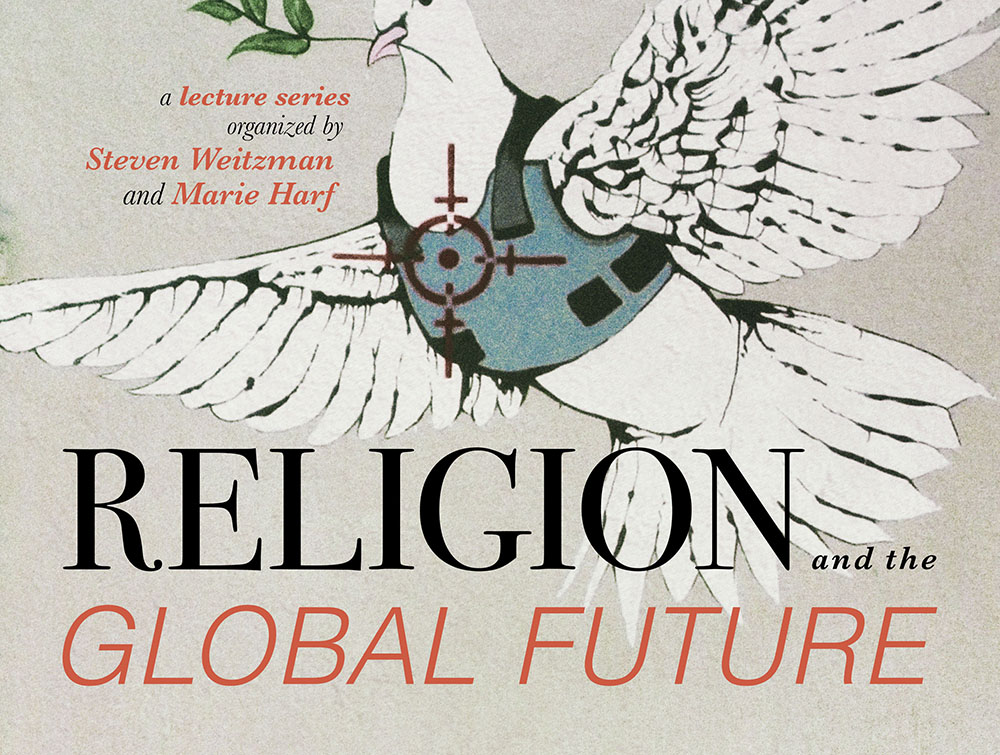Faith and the Future
A one-of-a-kind course led by Religious Studies Professor Steven Weitzman and Obama administration communications official Marie Harf weighs the connections between religion and modern global challenges.
According to Leila Ahmed, an Egyptian-American scholar of Islam, too many Westerners view hijabs as symbols of submission and oppression. In fact, Ahmed says, Muslim women who wear these and other headscarves can be passionate feminists striving for gender equity.
Megan Robb, Julie and Martin Franklin Assistant Professor of Religious Studies, highlighted the work of Ahmed and several other Islamic feminist thinkers during a talk she gave as part of the “Religion and the Global Future” lecture series last spring. Open to the entire Penn community, the series spurred from a Department of Religious Studies course of the same name.
Created by Steven Weitzman, Ella Darivoff Director of the Herbert D. Katz Center for Advanced Judaic Studies, and Marie Harf, senior strategic communications advisor for Secretary of State John Kerry during the Obama administration, the course explored religion in relation to humanity, government, and public policy around the world. The Katz Center recently posted the corresponding lecture series on its website as a collection of podcast episodes.
“You can’t understand what’s happening today without factoring in the role of religion,” says Weitzman, who is also the Abraham M. Ellis Professor of Hebrew and Semitic Languages and Literatures. “Even topics that seem unrelated, like technology or the environment, are connected in ways that are surprising even to scholars of religion.”
Weitzman and Harf met nearly 20 years ago, when he was her professor at Indiana University Bloomington. The two have kept in touch and last year decided to orchestrate a course that would bring experts from around the country to Penn to discuss religion’s influence on issues like international security, human rights, gender equality, economic stability, and climate change. Harf says they were inspired by a widespread failure among academics to examine religion’s intersection with these topics.
“We both wanted to do this because it combines an intellectual study of religion with current, real-world issues. Most people who study foreign policy don’t study religion, and vice versa,” says Harf, who delivered one of the lectures, “Religion and Conflict Resolution,” herself. During her tenure with the State Department, Harf explains, she observed firsthand how religion permeated negotiations with foreign adversaries, with examples including the Vatican’s assistance in facilitating U.S.-Cuba relations and the importance of respecting Islamic customs and traditions when navigating deliberations about the Iranian nuclear program.
“My former boss, John Kerry, always told us that you can’t negotiate with someone without understanding what motivates them and drives their decisions—and for millions of people, religion is a key part of that,” she says. “It has played a role in countless political issues and movements, military conflicts, peacemaking efforts, and other things we care deeply about, but we don’t usually take time to think about it.”
Supported by the Perry World House and a grant from the Penn Arts & Sciences Dean’s Global Inquiries Fund, the lecture series is free for anyone to stream at their convenience.
“We know it wasn’t easy for everyone to come to afternoon lectures, so posting them online is our effort to share these scholars’ insights with a broader audience,” Weitzman says. “The course made a significant contribution to discussion on campus—I had intended for this to be a one-time thing, but responses were so positive that I’m going to try to find a way to offer it again someday.”
Click here to listen the entire seven-part podcast series on "Religion and the Global Future."



